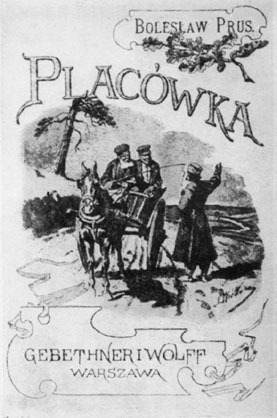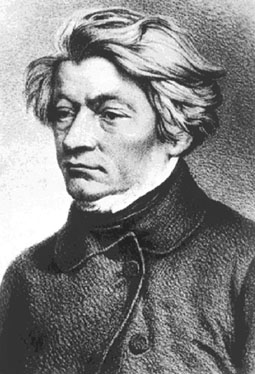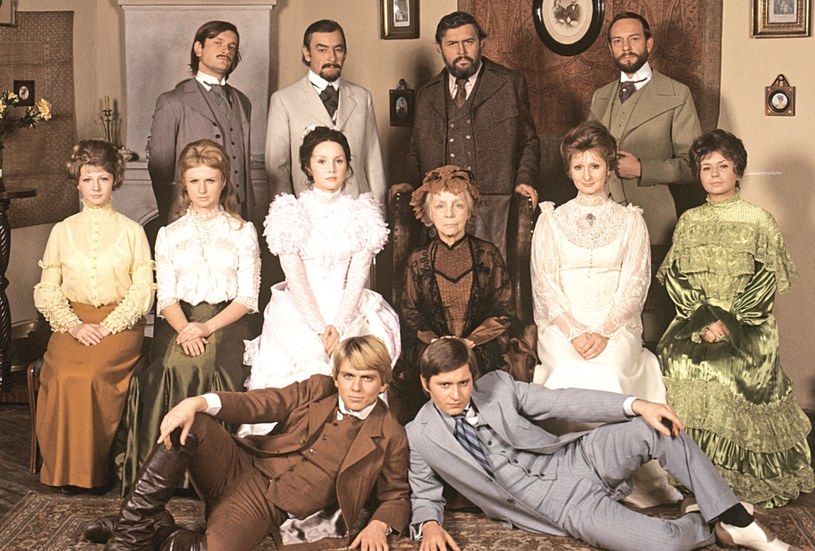Broadening your knowledge, awakening your reading
interests, and improving your writing skills - the required reading list is supposed to
do it all. However, not every student is as eager to read those books as their
teachers are. Instead of valuable pieces of literature, most of us see them as
a dull and painful duty.
In 2006, an
online article posed a question about the least liked books on the Polish
required reading list. The unfamous top ones were the following:
6th place: Anything written by Stefan Żeromski
Called ‘the
conscience of Polish literature’, Żeromski wrote several novels that made it
onto the required reading list: Labors of Sisyphus (“Syzyfowe
prace”), The Spring to Come (“Przedwiośnie”), Siłaczka, Homeless people (“Ludzie
bezdomni”)… His novels often raised a subject of social problems: poverty,
catastrophic social position of peasantry, countryside life. According to the
students, however, the biggest problem was not to fall asleep while reading.
5th place: The
Outpost ("Placówka")
by Bolesław Prus
The Outpost is a social novel - a study
of rural Poland under the country's foreign partitions. Very much like
Żeromski’s works, The Outpost shows
the plights of rural Poland in those times: poverty,
illiteracy, and lack of education. The plight of students reading the novel
seems to be comparable.
4th place: Dziady, Kordian and
Konrad Wallenrod by Adam Mickiewicz
Unlike Prus
and Żeromski, Mickiewicz belongs to the movement called Romanticism. Considered one of Poland's "Three Bards" and called “Poland's
national poet”, he wrote several novels - such as Pan Tadeusz, Dziady, Konrad
Wallenrod and Grażyna, serving as
inspiration for uprisings against the three imperial powers that had
partitioned Poland out of existence. His novels are full of typical Romantic
motifs - spontaneity, emotionalism, irrationality, fantasy and folklore.
Surprisingly,
only 3 out of 143 votes mentioned ‘Pan Tadeusz’ by Adam Mickiewicz as the worst
book on the required reading list.
3rd place: Nights
and Days
("Noce i dnie") by Maria Dąbrowska
2nd place: Upon the Niemen ("Nad
Niemnem") by Eliza Orzeszkowa
This Positivist novel written by Eliza
Orzeszkowa is another one that raises the subject of the Polish society on the
historical background of the January Uprising. The subject seems to be popular
on the required reading list - unlike in student’s minds.
Fun fact: according to Wikipedia, the
author included descriptions of 140 plants in the book. Surprisingly, it didn’t
make the novel any more interesting...
And the
winners are...The
Deluge ("Potop") and The Knights of the Cross ("Krzyżacy")
by Henryk Sienkiewicz.
This is a
controversial one: people either love it or hate it. Unlike other books on the
list, this one describes medieval times in Poland: knights, kings, fair
maidens, battles and adventures. However, it’s not nearly as popular among
young people as, let’s say, Game of
Thrones (which combines Middle Ages with fantasy). It seems that the
subject is less important than the writer’s style…
There are some important issues that should be raised when talking about
the required reading list. Should it consist of only the books
considered to be valuable in the Polish history even if students hate them? Or is it more important to
encourage students to read by showing them that literature can be exciting and
fun?
Q: Do you
agree with the survey? Did you like the books from the list? Would you add other
books?
Sources:







Comments
I understand the importance of books you listed but personally I hate almost all of them. Some of them were about historical facts but some of them was about polish rustic life and some weird romances and this is definitely not in my type.
Generally I think the required list of books is absolutely awful. They want to make children read by forcing them to read the most boring and surreal works? That's not working...
I wouldn't agree that all Polish books are dull. There are some great writers, like Mrożek, Sapkowski, Gombrowicz. Some of them are even on the required reading list.
However, I agree that the books I've mentioned are really dull - I hated them when I was in school :)
I think that nowadays people start to realise how dull some books are for the students, and some changes are being made regarding the list. Hopefully in the future students won't have such traumatic memories concerning the list :)
In my opinion the parents play the biggest role in learning kids to like reading. Both of my parents used to read to me a lot and they to this day read a lot of books on their own. If a child has a good example at home, they get used to books being around and parents give them books to read that are fun and enjoyable. So even if school books are dull the child learns to appreciate reading through different books. I'm sure there are a lot of exceptions but I've met a lot of people whose parents didn't read and they pretty much stopped reading after school when they no longer had to, because no one showed them it could be fun.
I often try to talk to my students (around 11-15yo) about the books they read and their answers are invariably the same: they hate reading with a passion. There are many reasons for that: short attention span, different interests, rebelling against duties or pure spite etc. The most they can be bothered to do is listening to audiobooks. Well, it isn't too surprising, looking at the subjects the books on the required reading list explore: work, more work and fighting for your motherland. They're hardly entertaining: the characters aren't relatable, the story is either too bleak or too full of pathos. In my school we were banned from reading Harry Potter books (without any explanation why, of course...). I think the most entertaining book I had to read was Master and Margarita.
So essentially we seem to be taught that contemporary literature is bad; there's hardly anything on the required reading list written after WW2. We're also taught that there's only one interpretation. Then you go to univeristy and discover that as long as you can give reasonable arguments, your reading is valid (maybe you didn't have it as bad, but all my schools were like that).
I know times change and that in the 19th century novel-reading was considered a vice and you could be locked up in an asylum, but I believe balance can be achieved. There are many books in contemporary literature which are valuable. Students should be encouraged to read; maybe introducing something more modern and more similar to our mindset would help with that? I certainly hope things will change.
The problem always seemed to me that the problems explored by 'school' books were mostly foreign to the modern reader, if one wasn't willing to make sn effort to think about them, and the books you said, and I absolutely agree, should be read by everyone weren't explored very often.
I often try to talk to my students (around 11-15yo) about the books they read and their answers are invariably the same: they hate reading with a passion. There are many reasons for that: short attention span, different interests, rebelling against duties or pure spite etc. The most they can be bothered to do is listening to audiobooks. Well, it isn't too surprising, looking at the subjects the books on the required reading list explore: work, more work and fighting for your motherland. They're hardly entertaining: the characters aren't relatable, the story is either too bleak or too full of pathos. In my school we were banned from reading Harry Potter books (without any explanation why, of course...). I think the most entertaining book I had to read was Master and Margarita.
So essentially we seem to be taught that contemporary literature is bad; there's hardly anything on the required reading list written after WW2. We're also taught that there's only one interpretation. Then you go to univeristy and discover that as long as you can give reasonable arguments, your reading is valid (maybe you didn't have it as bad, but all my schools were like that).
I know times change and that in the 19th century novel-reading was considered a vice and you could be locked up in an asylum, but I believe balance can be achieved. There are many books in contemporary literature which are valuable. Students should be encouraged to read; maybe introducing something more modern and more similar to our mindset would help with that? I certainly hope things will change.
Sometimes I'm jealeus about Western countries, which have a different way of selection of obligatory books for children in school.
I also agree that some books are really valuable and people should know them. However, I think that making a book obligatory to read doesn't necessarily make everyone read it. Maybe they should be picked more carefully and with respect to teen's interests? Or maybe only some chapters should be obligatory, and if you like it, you could read it further?
However, I must reassure you that some teenagers actually like reading - my 15-year-old brother, for example. His teacher is actually cool enough to let them read The Witcher and some Ursula le Guin for their Polish lessons :)
I think the problem starts when you try forcing people to read "Krzyżacy" and other "canonical" books. To this day I feel pride that I managed to read the whole thing :D It wasn't easy. It's hard to tell witch books are bad or good, for example - I really liked "Nad Niemnem" but I don't know anyone else who considers the thing readable. On the other hand I can't bear Sienkiewicz or Żeromski, I think that more time should be spent on authors like Kafka, Orwell or Gombrowicz.
Oh, I just remembered that I fell in love with Dostojwski's "Crime and Punishment". Maybe it would be a better idea to only read fragments of those huge books so that students could learn of their existence and maybe read the rest of those books if they like them (as if anyone would... haha). Then more time could be given to books that could actually capture young peoples attention and heart. Of coulrse love for books should be something kids learn at homes, but it doesn't help that schools associate reading mostly with gargantuan, boring, old books.
I feel like people don't like those books mainly, because they're told to read them. People don't really give them a chance. And that's a shame because they miss out on for example Adam Mickiewicz, who was a true master of his art. You may not appreciate what he wrote about, but his ability to create poetry was flawless.
But I do understand why people hate some of them, especially everything by Sienkiewicz. His writing style doesn't appeal to me at all and in my opinion he's done some bad things to the way people in Poland think (well, at least his books, it's not really his fault that people treat them as 100% historically accurate). I've spoken with too many people older than me that basically gained their entire geopolitical knowledge from his books (oftentimes, being unaware of it).
I also think it's a good idea to force students to read some chapters of various books. It's not unlikely they'll read the whole thing if they like it :) I've read some positions from the required reading list with real pleasure, and some excerpts from my textbook made me read the whole book.
Maybe a system like that would encourage students to read books that seem interesting to them :)
In my opinion at school we should read books about psychology, marketing, self-development and other in the area of our interest. This would be much interesting and helpful than reading those mentioned above.
What I recommend is to listen podcasts, if you don’t have time for audiobooks of reading books listen to YouTube shortcuts. People do great job with listing all the most important points from the book. We know that about 90% of book is about nothing and just 10% is interesting. If you have problems with understating something they present it graphically and explain everything.
Actually when I saw the title of the presentation I didn't expect that kind of books, but then again I got it - it is really good :D
In my high school career I didn't pay much attention to polish lessons and obligatory books, actually I disliked that subject, so I can't tell very much about this topic.